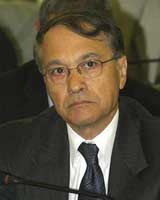|
Although both developing and developed nations are bearing the brunt of record oil prices, they disagree on the cause. While richer nations blame increased demand from developing countries, the latter accuse financial institutions manipulating prices through unregulated speculation in oil futures. All these views, and more, were voi at the one-day Jeddah Energy Summit attended by delegates from 36 countries and 22 oil companies. Speaking at the summit yesterday, Indian finance minister Chidambaram rejected the widespread view in the Western world that demand was causing the phenomenal rise in the price of oil. ''We respectfully reject the suggestion that rising demand is the cause of spiralling oil prices. The causes for the current pandemonium in oil prices lie elsewhere: In unregulated over-the-counter markets and futures trading in oil,'' he said. Justifying his stand, he asserted, "Surely demand and supply cannot explain what has happened over the last 12 months. Oil prices were $70 a barrel in August 2007 and how is it that they've doubled when there has been no dramatic change in demand?"  He was supported by OPEC president, Dr Chakib Khelil, Algeria's minister for energy and mines, who reiterated his view opposing increased production, saying "the price is disconnected from fundamentals" of supply and demand. "We believe that the market is in equilibrium. The price is disconnected from fundamentals. It is not a problem of supply." He was supported by OPEC president, Dr Chakib Khelil, Algeria's minister for energy and mines, who reiterated his view opposing increased production, saying "the price is disconnected from fundamentals" of supply and demand. "We believe that the market is in equilibrium. The price is disconnected from fundamentals. It is not a problem of supply."
He also proposed a new mechanism to regulate prices – a price band. Explaining the details of the proposal, he said, ''Consuming countries must guarantee that oil prices will not fall below an agreed level and producing countries must guarantee oil prices will not rise above a guaranteed level. In the band between these two levels, let prices be determined by market forces.'' Chidambaram felt such a price-band mechanism was the only way to ''shelter the world from volatility and unpredictability in oil prices.'' He also called for the oil industry to reassert its leadership in price formation. ''It should not remain passive spectator of speculation and paper trading in oil. The global hydrocarbon community must address the situation through appropriate supply-side responses and calm the oil market.'' The fact that the finance minister also attended the meeting instead of just the petroleum minister Murli Deora indicated the importance India attached to the summit, especially since no other finance minister, other than that of host Saudi Arabia, was present. Chidambaram explained that spiralling oil prices ''threaten to wipe out the economic gains made by the developing countries in recent years'' by diverting scarce resources from important sectors like health and education. ''I speak with great anguish because the goals we have set for ourselves are in grave peril,'' he added. However, India's views on the reasons of oil price rise, also supported by the oil producing nations, is completely opposed to the Western view of rising demand from developing countries. Addressing a round table on the sidelines of the conference, US Energy Secretary Sam Bodman insisted that huge demand was driving up the prices of oil. He refused to accept that speculators were the reason for the volatility of the market. His views were shared by British Prime Minister Gordon Brown, who had also attended the summit. In his speech, Brown offered a long-term deal whereby the oil-consuming nations would diversify energy supplies, moving into nuclear and renewable energy, and the oil-producing countries would increase production, as well as recycle some of their huge profits into western renewable technologies. Brown has stated that oil producers have earned $3 trilliion in extra profits from the latest oil shock. He also revealed Britain would host a follow-up summit in London, to build the shared analysis of what he described as the biggest problem of the world. The meeting will probably be held in October. Brown told the delegates that in the short term there was a clear need for extra oil production. "All of us need credible future commitments on increased oil supply because, even with the further action we propose to tackle climate change, demand for oil will continue to be strong over the medium term," he said. He insisted that the world has to address not just short-term under-production of oil, but the long-term boom in demand likely to come from China and India, a surge that requires the west to look for new sources of secure energy.
|